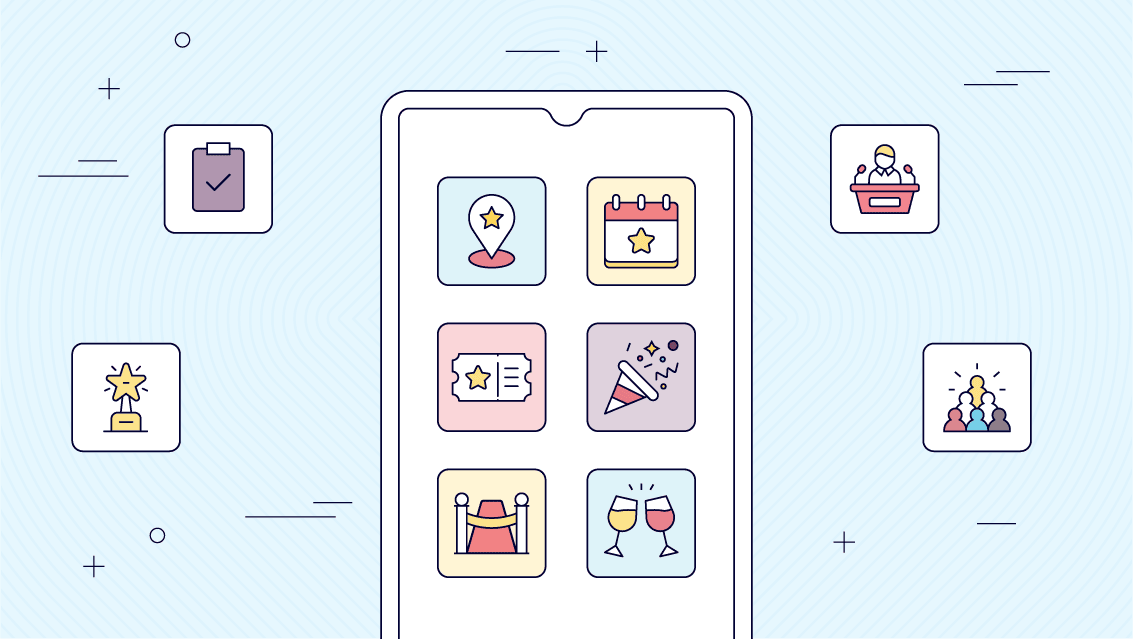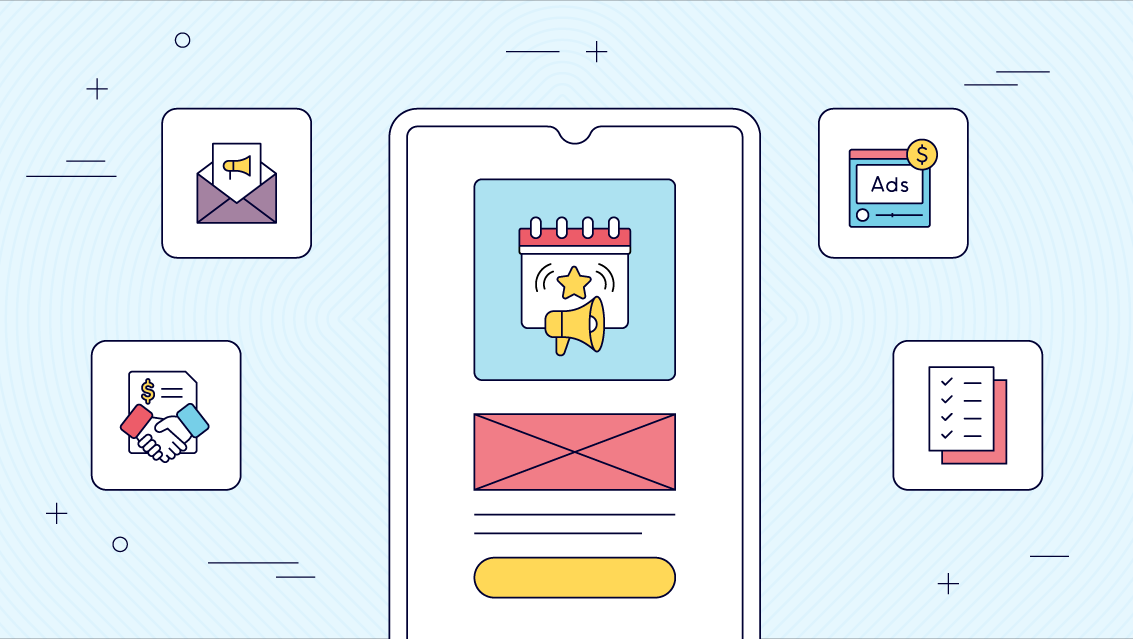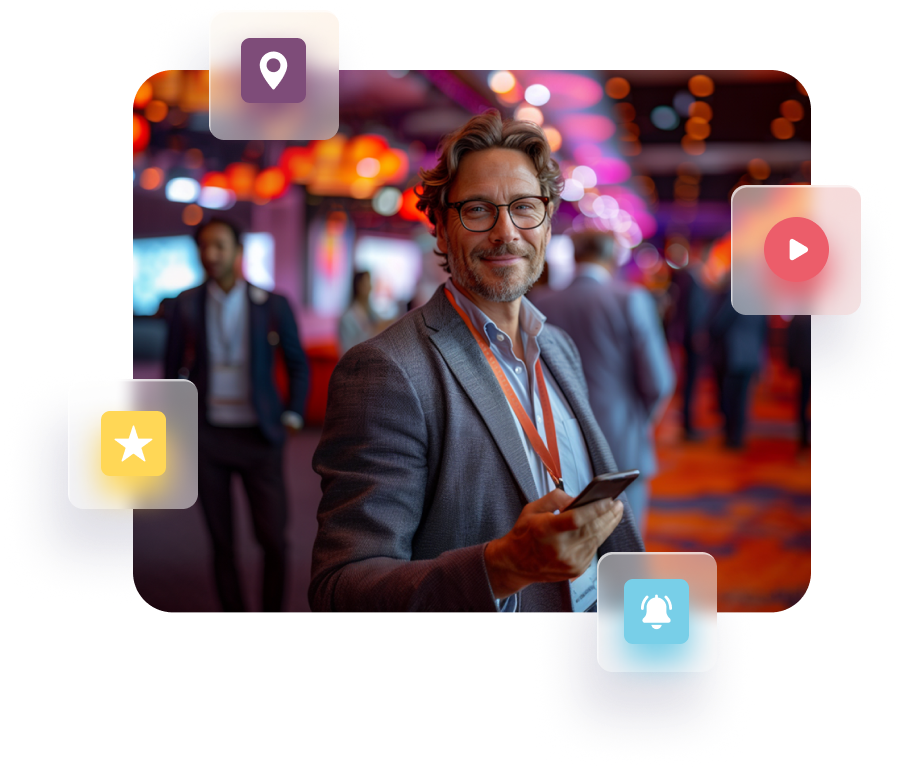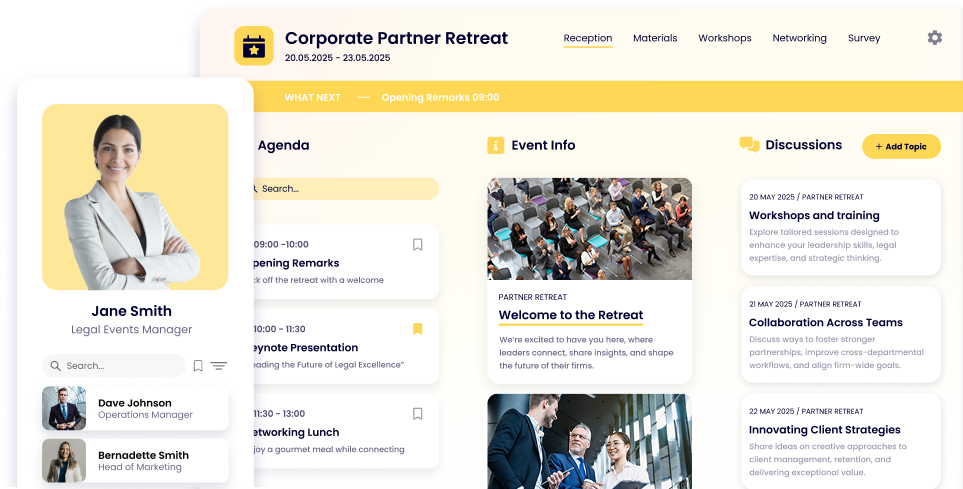Top Tips for Crafting an Effective Event Agenda: Templates & Examples

Lisa Broom | Head of Marketing
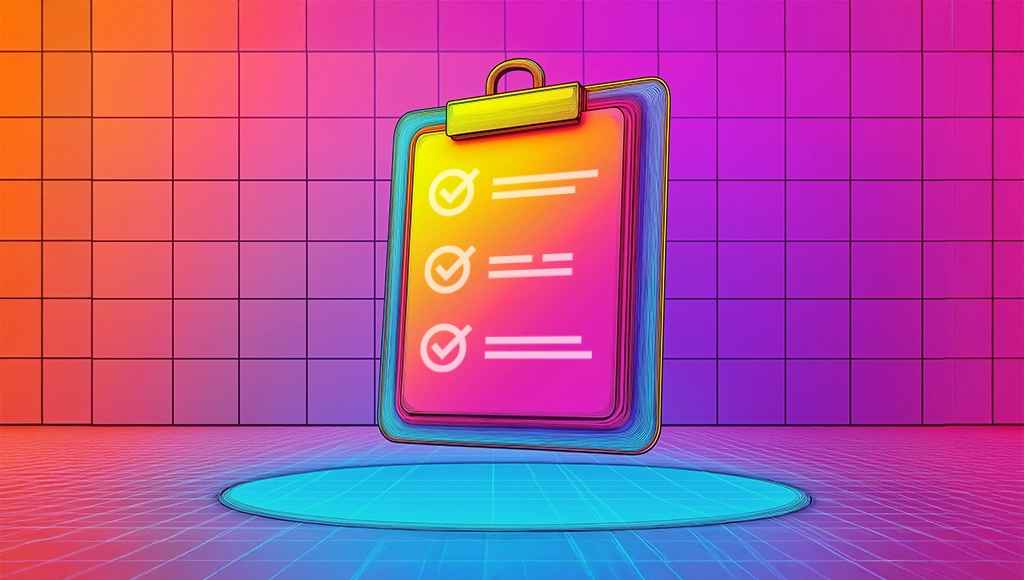
Struggling with your event agenda? Learn how to create detailed, effective agendas with our tips, templates, and examples. We’ll guide you through organizing your event for maximum participation and smooth execution.
Key Takeaways
- A well-structured event agenda acts as a roadmap, enhancing communication and time management to keep attendees engaged and informed.
- Key elements of an effective agenda include detailed session information, captivating speaker profiles, and precise timing to ensure a smooth and valuable experience.
- Incorporating attendee feedback and offering customizable options creates personalized agendas that resonate with participants and enhance overall satisfaction.
Understanding the Importance of an Event Agenda
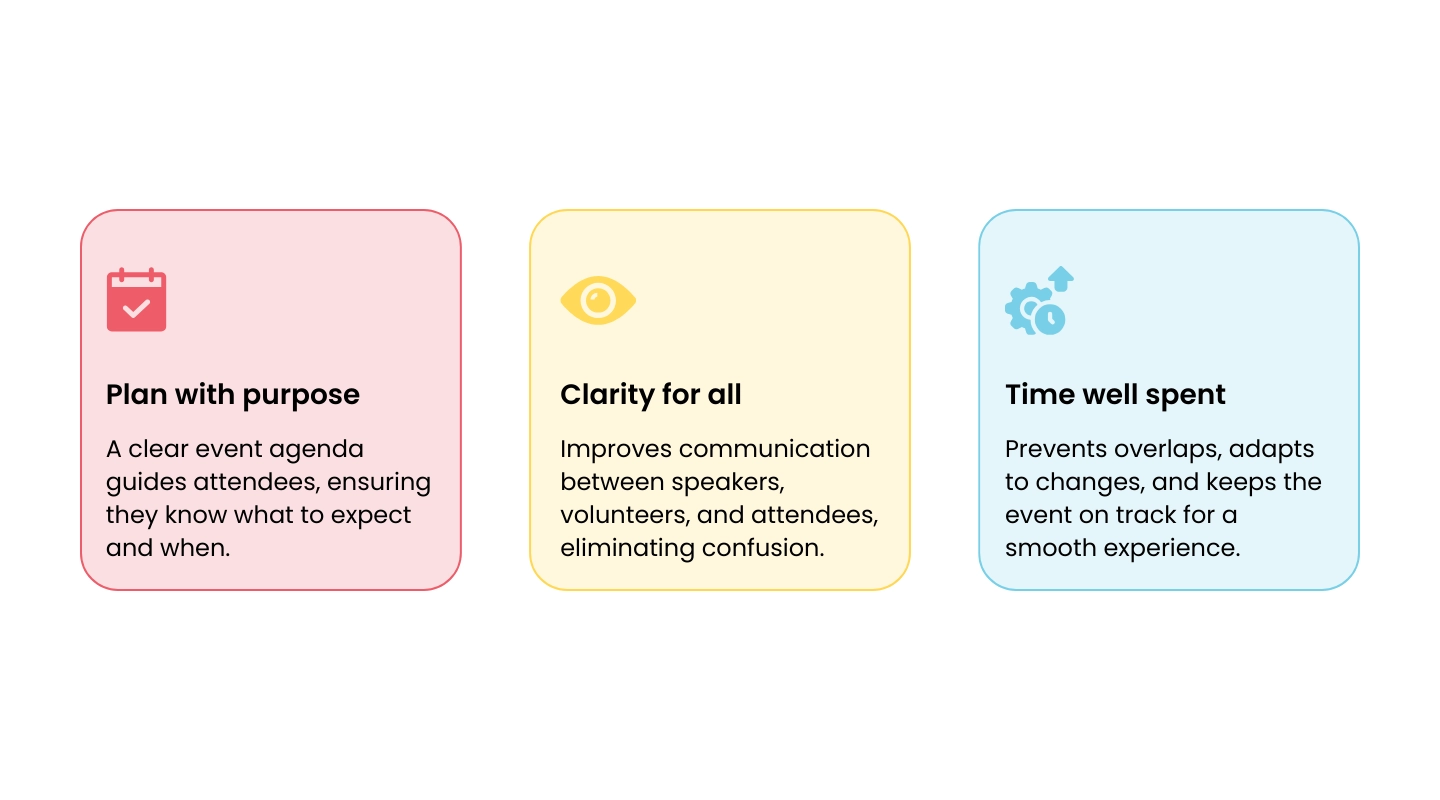
A well-structured event agenda serves as a roadmap that guides attendees through the day’s activities, ensuring everyone knows what to expect and when. It’s like the backbone of the event, holding everything together and providing a clear direction. Without it, even the most meticulously planned event can quickly descend into chaos.
Creating a detailed agenda improves communication among speakers, volunteers, and attendees by clarifying the event’s schedule. Imagine being a speaker at a conference with no clear idea of when your session starts or a participant unsure of when to take breaks. A comprehensive agenda eliminates these uncertainties, allowing everyone to plan their time effectively and stay engaged throughout the event.
Moreover, an event agenda aids in time management by specifying session durations and preventing overlap. It allows for flexibility, making adjustments in response to unforeseen circumstances, thus reducing disruptions and keeping the event on track. A well-crafted agenda enhances the attendee experience and ensures smooth event execution.
Key Elements of a Killer Event Agenda
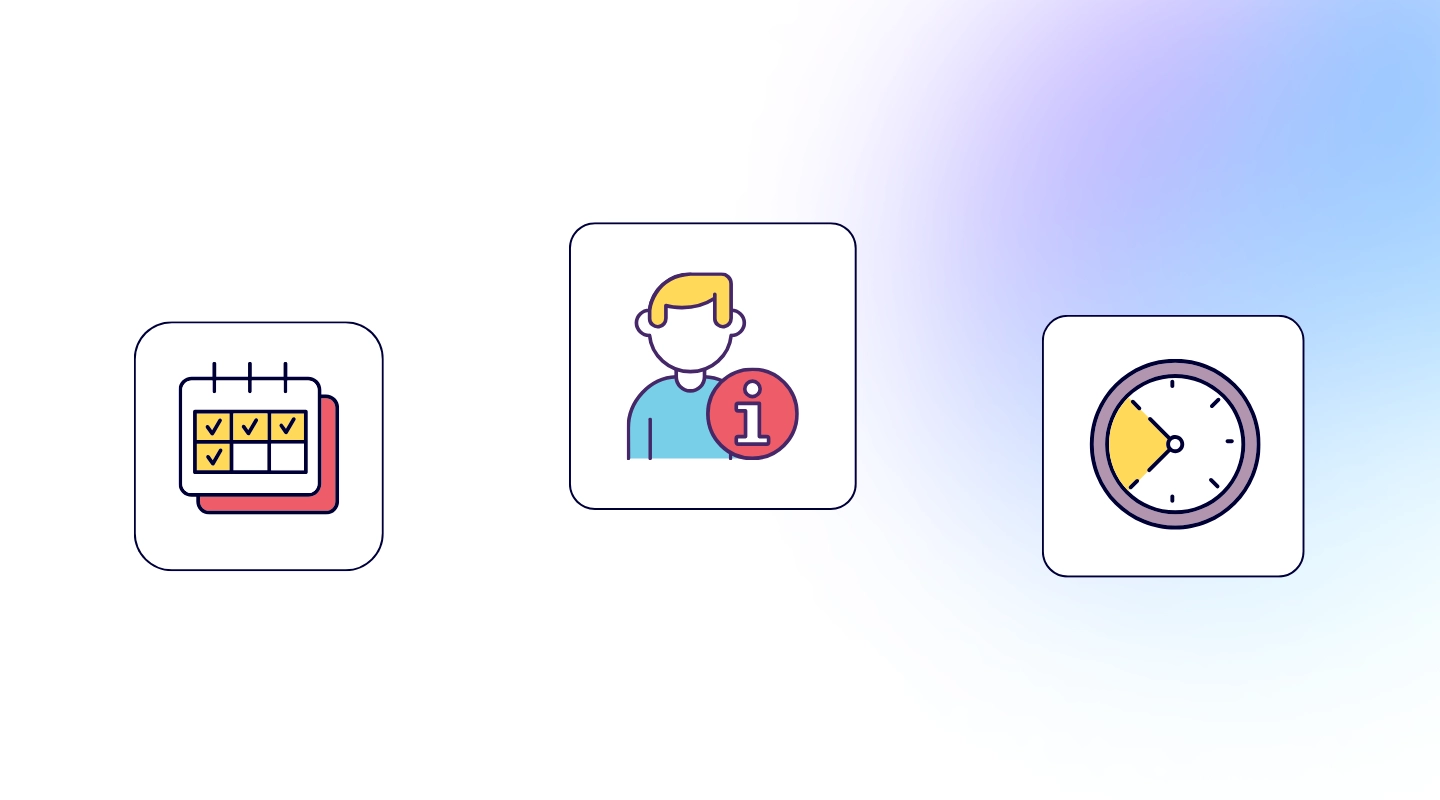
An effective event agenda goes beyond merely listing activities. Careful consideration of session details, speaker information, and precise timing and scheduling is essential.
These components ensure your event successful is well-organized, engaging, and valuable for all attendees.
Session Details
Session details are the heart of any event agenda. They should include specific details like speakers, session durations, and the order of events to enhance organization and clarity. Imagine an attendee arriving at a session with no idea of what to expect. A small blurb explaining each task’s purpose provides clarity, ensuring attendees are prepared and engaged.
Clearly defining session objectives ensures the audience gains the most knowledge possible throughout the event. Structuring sessions effectively within an event agenda is crucial for ensuring a smooth flow and maximizing attendee engagement.
Meticulous planning of these details keeps the momentum and maintains high energy levels throughout the event.
Speaker Information
Including detailed information about guest speakers in your event agenda significantly enhances audience expectations and interest in the event. Guest speakers should align with the event themes to resonate with attendees. A speaker’s presentation style can greatly influence audience engagement and information retention, so selecting captivating and inspiring speakers is crucial.
A diverse lineup of speakers brings various perspectives and attracts a wider audience, boosting overall event appeal. Comprehensive speaker information elevates the attendee experience and creates a buzz that attracts more participants.
Timing and Scheduling
Accurate timing minimizes downtime and enhances event flow. Precise timing creates a seamless experience that keeps attendees engaged and satisfied. Multi-day conference agendas typically feature varied sessions, breaks, and activities to cater to diverse attendee interests and maintain engagement.
A 5- or 10-minute warning for speakers before sessions end helps avoid overlap and keeps the event on schedule. Meticulous timing and scheduling ensure the event runs like a well-oiled machine, with each session starting and ending as planned.
Steps to Create a Comprehensive Event Agenda
Developing a comprehensive event agenda requires several critical steps. Start by defining event goals, researching guest speakers, and structuring sessions effectively. These steps form the backbone of your agenda, ensuring that it aligns with the overall objectives of your event and meets the expectations of your attendees.
Define Event Goals
Clear goals are crucial for event success, providing direction and purpose. Clear objectives help determine the right activities and sessions that align with attendees’ needs. Polling attendees during events enhances immediate involvement and engagement.
Incorporating mindfulness sessions can improve attendee satisfaction and enhance the overall experience. Unique networking setups can facilitate higher interaction rates among attendees at events. Tailored engagement strategies contribute to higher satisfaction and success rates at events.
Research Guest Speakers
Discuss with the team and create a list of potential speakers. Speakers should specialize in the event’s goals to enhance relevance and impact. Monetary incentives can attract high-profile guest speakers. Having guest speakers provides access to more knowledge and information about the industry, enriching the content of your event.
Carefully selecting speakers who align with your event’s objectives ensures informative, engaging, and impactful sessions.
Structure Your Sessions
Offer a variety of session types, such as panel events, lightning talks, and specialized workshops, to cater to diverse preferences. Include scheduled times for every session, break, and meal to ensure a clear structure. Time allocations for each session help to ensure attendees effectively manage their agenda and stay engaged.
Specific times for each session maintain a predictable flow, enhancing the overall participant experience. Scheduled breaks are crucial for refreshing attendees and maintaining focus.
Clear timings and designated breaks ensure a fluid schedule and enhance attendee engagement.
Tips for Personalizing Your Event Agenda
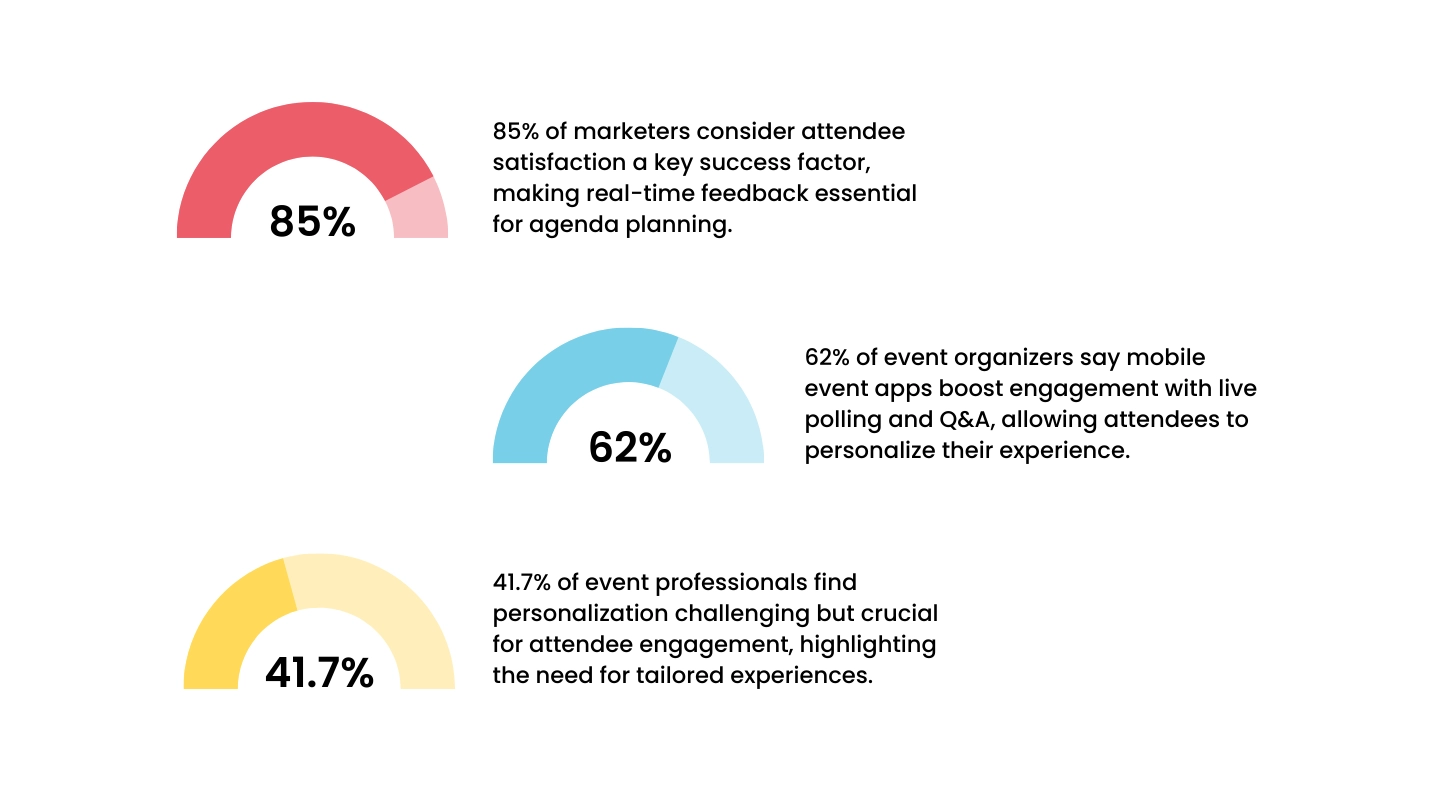
Personalized agendas are vital as attendees seek experiences beyond traditional meetings. Event planners report a shift towards experience creation over logistical planning. Attendee control is crucial as they desire input on meeting formats, helping them feel more invested.
Event apps personalize attendee experiences with features like real-time updates and session details.
Utilize Attendee Feedback
Participant input when creating an agenda aligns with audience needs and enhances knowledge gain. Organizers can crowdsource feedback and adjust agendas in real time using live polling. Post-event survey feedback is crucial for planning the next event and its agenda.
Creating attendee personas helps tailor experiences and personalize the agenda to meet diverse preferences. Incorporating attendee feedback creates an agenda that resonates with your audience and meets their expectations.
Offer Customizable Options
A mix of customizable options meets the diverse needs of attendees. Technology like live polling apps facilitates attendee-driven agenda personalization. Mobile applications with features like live polling and attendee Q&A enhance engagement during events.
Interactive breakout areas give attendees a sense of choice and control within a single venue. Mobile applications provide instant notifications and reminders, enhancing engagement during events.
Highlight Unique Features
Detailed speaker profiles in the agenda elevate attendee interest and provide session context. C2 Montreal offered attendees custom experiences, including smoothie shots, Cirque du Soleil performances, and food trucks.
Dreamforce incorporates mindfulness sessions such as Leadership Builder, Learning to Listen, and Igniting Creativity to ensure attendee happiness and engagement. Networking spaces at C2 Montreal included private meeting cabins and hanging trapeze chairs, leading to over 3,000 face-to-face meetings.
Using Technology to Enhance Event Agendas
Technology plays a critical role in managing event agendas effectively. Modern technology streamlines the process of staying on track with event agendas.
Mobile Apps for Real-Time Updates
Some event organizers utilize customizable apps to deliver real-time updates. The Big Dub Festival event agenda serves as a guide for attendees. It helps them navigate various stages and performers efficiently. An event organizer can enhance attendee experience by providing real-time updates through mobile apps.
Real-time updates through mobile apps significantly contribute to the overall success of events by improving attendee engagement and satisfaction.
Examples of Effective Event Agendas
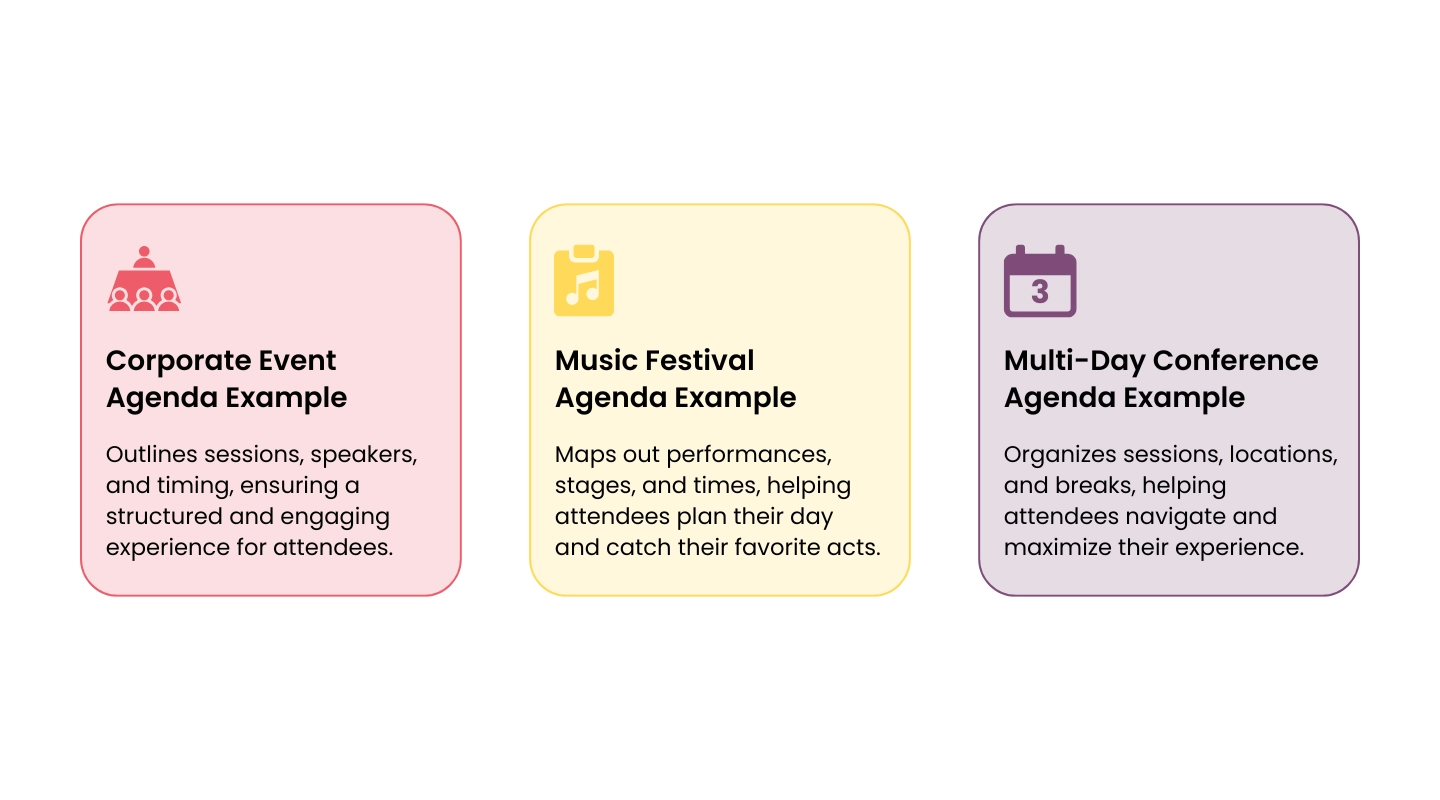
Real-world examples of effective event agendas offer valuable insights and inspiration for creating your own. From corporate events to music festivals and multi-day conferences, each type of event requires a tailored agenda that meets the specific needs and expectations of its attendees.
Corporate Event Agenda Example
A corporate event agenda typically includes the order of events, speakers, and session durations, providing a clear structure for business meetings and networking opportunities. Using engaging phrases like ‘spoiler alert’ attracts potential attendees and generates excitement.
A thoughtfully structured corporate event agenda enhances engagement and maximizes networking opportunities. Informing attendees about the schedule and structure ensures they are prepared and can maximize their event experience.
Music Festival Agenda Example
Agendas in music festivals are crucial for managing performance schedules, including stage locations and show durations. Music festival agendas outline performance times and essential venue details like stage names and locations.
A well-structured music festival agenda guides attendees and enhances their experience. Clear agenda information helps attendees plan their day, ensuring they don’t miss favorite performances.
Multi-Day Conference Agenda Example
An agenda for multi-day events is invaluable for navigation and organization. Multi-day conference agendas typically include details like performer locations and scheduled breaks.
An event planning agenda template should track preparation steps, target audience, event objectives, and risk assessment to enhance attendee experiences. Meticulous daily planning ensures attendees can navigate the conference with ease and make the most of their time using an event agenda template.
Promoting Your Event Using the Agenda
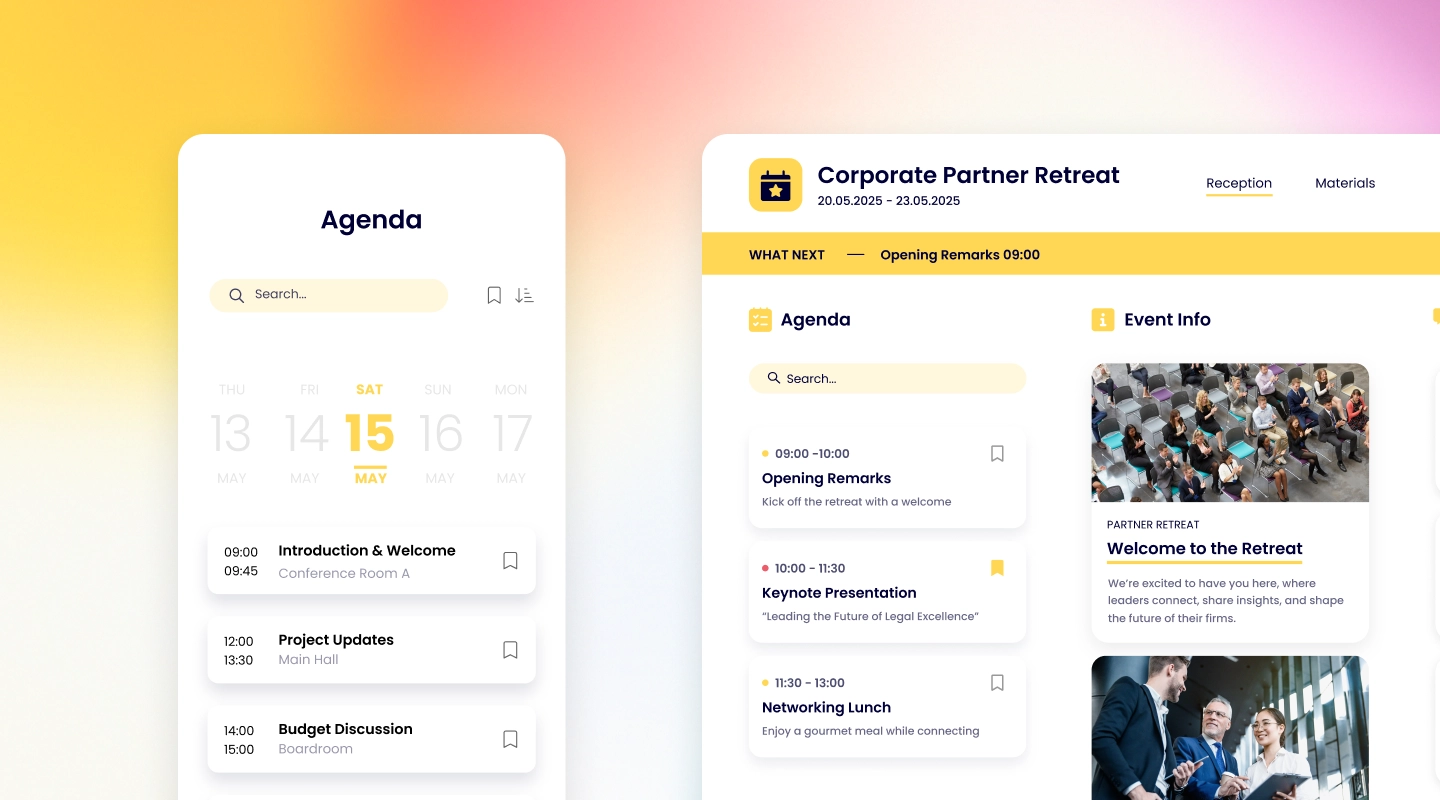
Event agendas can be creative marketing assets enhancing the event’s visibility. Using agendas to tease the event creates buzz and effectively engages potential attendees.
Planning keynote speakers, breakout sessions, and other details around event goals optimizes engagement. Innovative agendas can be leveraged for marketing throughout the planning process, from initial promo to onsite engagement.
Social Media Teasers
Teaser campaigns on social media create anticipation by gradually revealing details about an event, ideally starting two to three weeks before the event date. Effective teaser marketing uses visually intriguing content that encourages audience engagement through questions or challenges.
An aura of mystery with visual clues enhances audience interest and prompts interaction leading up to the event. The culmination of a teaser campaign is the official announcement, which should excite the audience and encourage them to participate actively in the event.
Instagram Stories countdowns create anticipation and allow viewers to sign up for notifications.
Influencer Partnerships
Micro-influencers can increase awareness about an event agenda due to their niche followings and engagement rates. Partnering with industry experts and influencers significantly enhances event agenda promotion.
Choosing the right influencer type is crucial for effectively spreading the word about the event. By leveraging the reach and credibility of influencers, you can create a buzz around your event and attract a larger audience.
Email Campaigns
Email campaigns are crucial for promoting your event agenda, building awareness and interest among potential attendees. Ensure email content is engaging and informative, providing clear details about the event agenda and its key features.
Targeting the right audience in email campaigns maximizes engagement and encourages registrations. Measure email campaign success by tracking open rates, click-through rates, and registration conversions.
Summary
Crafting an effective event agenda is a meticulous process that pays off in the form of a well-organized and engaging event. By understanding the critical components, defining clear goals, researching and selecting the right speakers, and structuring sessions effectively, you can create an agenda that meets the needs of your attendees and ensures the success of your event.
Personalizing your agenda, leveraging technology, and using it as a promotional tool can further enhance the experience for your attendees and increase the visibility of your event. Remember, a killer event agenda is not just a schedule; it’s a strategic tool that can transform your event into an unforgettable experience.
FAQs
How do you write an agenda for an event?
To create an effective agenda for your event, clearly define its goals and purpose while inviting input from participants. Organize key sessions, allocate time for each item, and communicate the finalized agenda to boost engagement and ensure a successful event!
How do you create an agenda?
To create an effective agenda, clearly define the meeting’s objectives, gather input from participants, and allocate time for each topic. This structured approach will keep your meeting focused and productive!
Why is an event agenda important for successful event planning?
An event agenda is crucial for successful planning as it acts as a roadmap, ensuring clear communication and engagement while managing time effectively. Embrace this tool to elevate your event’s success and keep everyone on track!
What are the key elements of a killer event agenda?
A killer event agenda should include clear session details, engaging speaker information, and precise timing for each segment. This structure keeps attendees informed and excited about what’s to come!
How can technology enhance event agendas?
Embracing technology, especially mobile apps, greatly enhances event agendas by delivering real-time updates and boosting attendee engagement. This not only keeps everyone informed but also creates an interactive and memorable experience!


